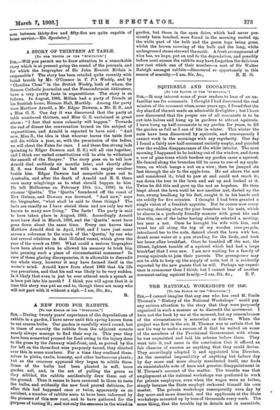A STORY OF THIRTEEN AT TABLE.
[To THE EDITOR OF TOE SPECTATOR:1 SIR,—Will you permit me to draw attention to a remarkable story which is at present going the round of the journals, and for which the biographer of Sir John Everett Millais is responsible P The story has been retailed quite recently with bated breath by Mr. O'Connor in P. P.'s Weekly, and by " Claudius Clear" in the British Weekly, both of whom, the Roman Catholic journalist and the Nonconformist littgrateur, have a very pretty taste in superstitions. The story is as follows. In August, 1885, Millais had a party of friends at his Scottish home, Birnam Hall, Murthly. Among the party were Matthew Arnold, a Mr. Edgar Dawson, a Mr. E. S., and a Miss G. S. One day it was discovered that the party at table numbered thirteen, and Miss G. S. exclaimed in great alarm : "I fear that some calamity will happen." Towards the end of dinner the conversation turned on the subject of superstitions, and Arnold is reported to have said: " And now, Miss S., the idea is that whoever leaves the table first will die within a year, so, with the permission of the ladies, we will cheat the Fates for once. I and these fine strong lads (pointing to Edgar Dawson and E. S.) will all rise together, and I think our united constitutions will be able to withstand the assault of the Reaper." The story goes on to tell how Arnold died suddenly six months later, and shortly after E. S. was found dead in bed with an empty revolver beside him. Edgar Dawson had meanwhile gone out to Australia, and after the death of Arnold and E. S. there were many misgivings as to what should happen to him. He left Melbourne on February 18th (i.e., 1886) in the steamer Quetta.' The ' Quetta' foundered off the coast of New Guinea, and Dawson was drowned. "And now," says the biographer, "what shall be said to these things ? The facts are exactly as I have stated them and are only too well known to many now living." The facts ! The party is said to have taken place in August, 1885. Accordingly Arnold must have died in March, 1886, and the ' Quetta' must have gone down about the same time. Every one knows that Matthew Arnold died in April, 1888, and I have just come across a reference to the wreck of the Quetta,' by one who lost several relatives in that ill-fated vessel, which gives the year of the wreck as 1890. What could a serious biographer have been about when he allowed his memory to trick him into penning such a piece of circumstantial nonsense P In view of these glaring discrepancies, it is allowable to discredit the whole story, however it may have formed itself in the writer's mind. Arnold knew from about 1868 that his life was precarious, and that his end was likely to be very sudden. Is it likely that even in jest he ever uttered such a speech as is here put into his mouth P I think you will agree that it is time this story was put an end to, though there are many who will not part with it without a sigh.—I am, Sir, &c., R.














































 Previous page
Previous page